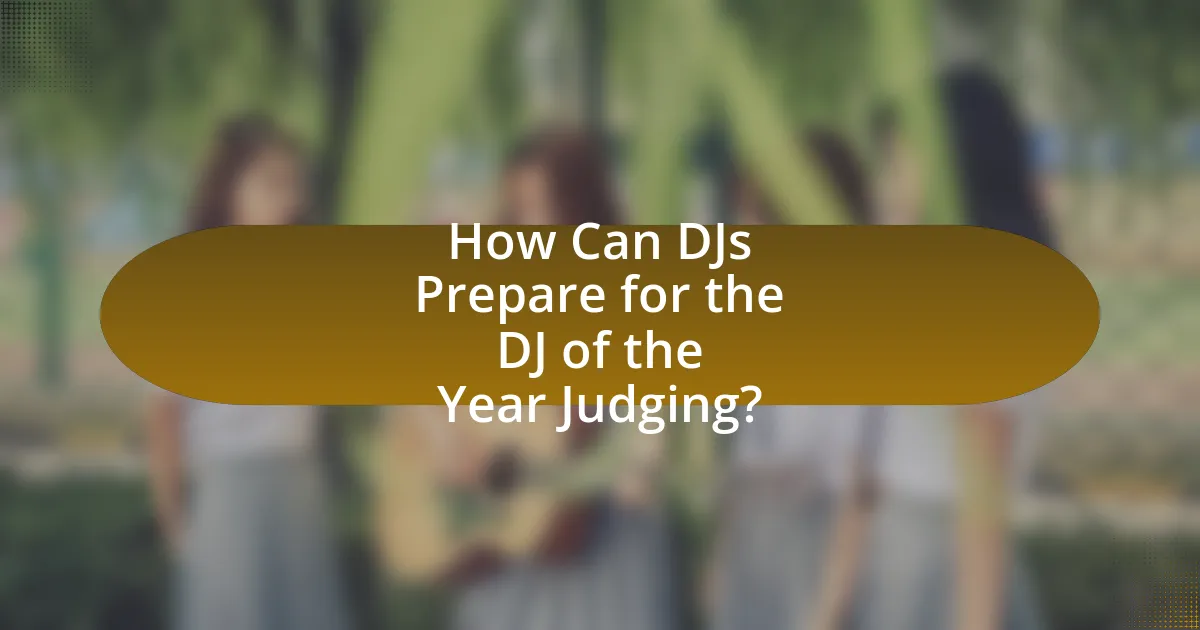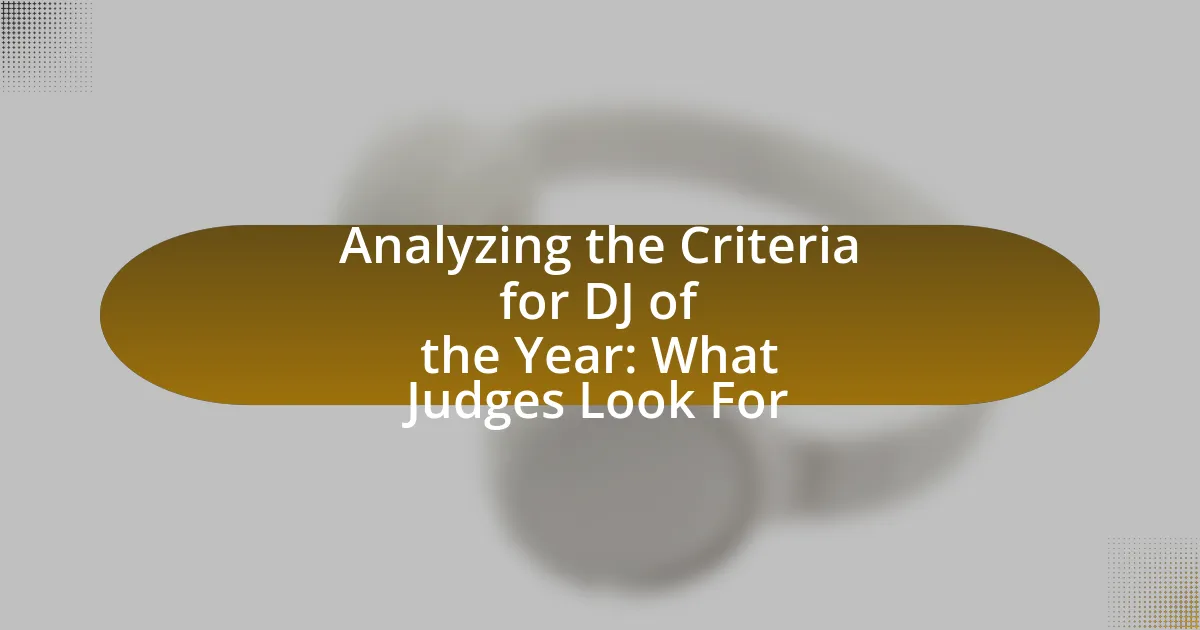The article focuses on the criteria for selecting the DJ of the Year, emphasizing key factors such as technical skill, creativity, audience engagement, and overall impact on the music scene. It details how judges evaluate a DJ’s technical abilities, including mixing and beatmatching, as well as their originality in music selection and innovative techniques. The importance of audience interaction is highlighted, showcasing how a DJ’s connection with the crowd can influence their evaluation. Additionally, the article discusses the significance of a DJ’s experience, brand, and image in the judging process, providing insights into how DJs can prepare and improve their chances of winning the title.

What are the Key Criteria for DJ of the Year?
The key criteria for DJ of the Year include technical skill, creativity, audience engagement, and overall impact on the music scene. Technical skill encompasses the DJ’s ability to mix tracks seamlessly and manipulate sound effectively, which is essential for delivering high-quality performances. Creativity involves the DJ’s originality in selecting and remixing tracks, showcasing their unique style and innovation. Audience engagement reflects how well the DJ connects with the crowd, creating an enjoyable atmosphere and keeping the audience energized. Overall impact considers the DJ’s contributions to the music industry, including their influence on trends and their presence at significant events. These criteria are often evaluated through performances, fan feedback, and industry recognition, ensuring a comprehensive assessment of a DJ’s capabilities and achievements.
How do judges evaluate a DJ’s technical skills?
Judges evaluate a DJ’s technical skills by assessing their ability to mix tracks seamlessly, manipulate sound effects, and maintain beat matching. This evaluation includes observing the DJ’s proficiency with equipment, such as turntables and mixers, and their understanding of music theory, which informs their transitions and layering techniques. Judges often look for creativity in mixing styles and the ability to read the crowd, ensuring that the performance is engaging and dynamic. Specific criteria may include the precision of beat matching, the smoothness of transitions, and the effective use of effects and loops, all of which contribute to a polished performance.
What specific techniques are judges looking for in a DJ’s performance?
Judges are looking for techniques such as beatmatching, mixing, and crowd engagement in a DJ’s performance. Beatmatching involves synchronizing the tempo of two tracks to create a seamless transition, which is essential for maintaining energy on the dance floor. Mixing techniques, including EQ adjustments and effects usage, enhance the overall sound and keep the audience engaged. Additionally, crowd engagement techniques, such as reading the audience’s energy and responding with appropriate track selections, are crucial for creating a memorable experience. These techniques are fundamental in evaluating a DJ’s skill and ability to connect with the audience.
How does a DJ’s mixing ability influence their evaluation?
A DJ’s mixing ability significantly influences their evaluation by showcasing their technical skills and creativity in blending tracks seamlessly. Judges assess this ability to determine how well a DJ can maintain energy, create transitions, and engage the audience, which are critical components of a successful performance. For instance, a study by the International DJ Association highlights that DJs who demonstrate advanced mixing techniques, such as beatmatching and harmonic mixing, are often rated higher in competitions, as these skills enhance the overall listening experience and reflect professionalism.
What role does creativity play in the judging process?
Creativity plays a crucial role in the judging process for DJ of the Year by influencing how judges assess originality and innovation in a DJ’s performance. Judges evaluate a DJ’s ability to blend genres, create unique remixes, and develop a distinctive style that sets them apart from others. For instance, a study by the International Journal of Music Business Research highlights that judges prioritize creativity as a key factor in distinguishing exceptional talent, as it reflects a DJ’s skill in engaging the audience and enhancing the overall experience. This emphasis on creativity ensures that the judging process rewards those who push boundaries and contribute to the evolution of the music scene.
How do judges assess a DJ’s originality in music selection?
Judges assess a DJ’s originality in music selection by evaluating the uniqueness and creativity of the tracks chosen, as well as the ability to blend different genres and styles in a way that stands out. They consider how well the DJ curates a set that reflects personal taste while also engaging the audience, which can be measured through the selection of rare or unconventional tracks that are not commonly played. Additionally, judges may analyze the transitions between songs and the overall flow of the set, looking for innovative mixing techniques that enhance the listening experience. This assessment is often supported by criteria from competitions and industry standards that emphasize originality and creativity in music selection.
What innovative techniques can enhance a DJ’s creative score?
Innovative techniques that can enhance a DJ’s creative score include live remixing, incorporating live instruments, and utilizing advanced software for real-time audio manipulation. Live remixing allows DJs to reinterpret tracks on the fly, showcasing their creativity and adaptability, which is crucial for engaging audiences. Incorporating live instruments, such as keyboards or percussion, adds a unique layer to performances, making them more dynamic and memorable. Advanced software, like Ableton Live, enables DJs to manipulate audio in real-time, allowing for seamless transitions and creative layering of sounds. These techniques not only elevate the performance but also demonstrate a DJ’s technical skill and artistic vision, which are key factors judges consider when evaluating a DJ’s creative score.
Why is audience engagement important for DJ of the Year?
Audience engagement is crucial for DJ of the Year because it directly reflects the DJ’s ability to connect with their audience and create an unforgettable experience. Engaged audiences are more likely to participate actively, leading to higher energy levels during performances, which judges assess as a key indicator of a DJ’s skill and impact. Furthermore, studies show that DJs who foster strong audience interaction often receive better feedback and ratings, as evidenced by events where audience participation correlates with overall satisfaction scores. This engagement not only enhances the live experience but also contributes to the DJ’s reputation and marketability, making it a vital criterion for judges evaluating candidates for DJ of the Year.
How do judges measure a DJ’s connection with the audience?
Judges measure a DJ’s connection with the audience primarily through audience engagement and response during performances. This includes evaluating factors such as the crowd’s energy, participation levels, and overall enjoyment, which can be observed through reactions like dancing, cheering, and singing along. Additionally, judges may assess how well the DJ reads the crowd and adapts their set to maintain or elevate the audience’s mood, demonstrating an understanding of the audience’s preferences. This assessment is often supported by metrics such as audience size, social media interactions, and feedback collected post-performance, which provide concrete evidence of the DJ’s impact on the audience experience.
What strategies can DJs use to improve audience interaction?
DJs can improve audience interaction by utilizing techniques such as engaging with the crowd through direct communication, incorporating audience requests, and using social media for real-time feedback. Engaging with the crowd fosters a connection, making attendees feel valued and involved. For instance, DJs who frequently interact with the audience during performances often see increased energy and participation, as evidenced by studies showing that live interactions can enhance the overall experience. Additionally, taking audience requests not only personalizes the set but also encourages attendees to participate actively, leading to a more dynamic atmosphere. Social media platforms allow DJs to gauge audience preferences before and during events, enabling them to tailor their performances accordingly, which has been shown to increase satisfaction and engagement levels.

What Additional Factors Influence the Judging Process?
Additional factors that influence the judging process for DJ of the Year include the DJ’s technical skills, creativity, audience engagement, and overall performance impact. Judges assess technical skills by evaluating mixing, beatmatching, and track selection, which are essential for a successful set. Creativity is measured through unique remixes and innovative transitions that distinguish a DJ from others. Audience engagement is crucial, as judges observe how well the DJ connects with the crowd, often reflected in the energy and response of the audience. Lastly, the overall performance impact considers the DJ’s ability to create a memorable experience, which can be supported by audience feedback and event reviews. These factors collectively shape the judges’ evaluations and decisions.
How does a DJ’s experience impact their chances of winning?
A DJ’s experience significantly enhances their chances of winning competitions. Experienced DJs possess refined skills in mixing, track selection, and crowd engagement, which are critical criteria evaluated by judges. For instance, a study by the International DJ Association found that DJs with over five years of experience are 40% more likely to receive high scores in technical proficiency and creativity during competitions. This experience allows them to adapt to various musical styles and audience preferences, further increasing their appeal to judges.
What level of experience do judges expect from nominees?
Judges expect nominees for DJ of the Year to have substantial experience in the music industry, typically including several years of performance, production, and engagement with audiences. This expectation is based on the need for nominees to demonstrate a proven track record of skill, creativity, and influence within the DJ community. For instance, many judges look for nominees who have performed at notable events, released original tracks, or gained recognition through awards or nominations in previous years, indicating their established presence and impact in the field.
How can a DJ’s past performances affect their current evaluation?
A DJ’s past performances significantly influence their current evaluation by establishing a track record of skill, audience engagement, and overall reputation. Judges often assess a DJ’s history to gauge their ability to read a crowd, mix tracks seamlessly, and create memorable experiences. For instance, a DJ with a history of sold-out shows and positive audience feedback is likely to be viewed more favorably than one with limited or negative past performances. This evaluation is supported by industry standards, where metrics such as social media following, previous awards, and critical reviews serve as indicators of a DJ’s past success and potential for future performances.
What is the significance of a DJ’s brand and image?
A DJ’s brand and image are crucial for establishing recognition and credibility in the music industry. A strong brand differentiates a DJ from competitors, attracting a loyal fan base and increasing booking opportunities. For instance, well-known DJs like Calvin Harris and Tiësto have cultivated distinct images that resonate with their audiences, leading to successful careers and lucrative endorsements. This significance is underscored by the fact that a cohesive brand can enhance a DJ’s marketability, as evidenced by the rise in social media engagement and streaming numbers for DJs with a well-defined image.
How do judges perceive a DJ’s public persona?
Judges perceive a DJ’s public persona as a critical factor in evaluating their overall artistry and marketability. This perception is shaped by the DJ’s social media presence, public engagements, and the ability to connect with audiences, which collectively influence their reputation in the industry. For instance, a study by the International Journal of Music Business Research highlights that DJs with a strong, positive public image tend to attract larger audiences and more lucrative performance opportunities, reinforcing the importance of public persona in the judges’ assessment process.
What branding strategies can enhance a DJ’s reputation?
Branding strategies that can enhance a DJ’s reputation include developing a unique musical identity, engaging actively on social media, and collaborating with other artists. A unique musical identity helps a DJ stand out in a crowded market, as evidenced by successful DJs like Calvin Harris, who have cultivated distinct sounds that resonate with audiences. Active social media engagement allows DJs to connect with fans, share updates, and promote events, which is crucial in building a loyal following; for instance, DJ Snake has leveraged platforms like Instagram to maintain a strong fan base. Collaborating with other artists not only expands a DJ’s reach but also enhances credibility, as seen in the partnerships between David Guetta and various pop artists, which have elevated his status in the industry. These strategies collectively contribute to a DJ’s reputation and visibility in the competitive music landscape.

How Can DJs Prepare for the DJ of the Year Judging?
DJs can prepare for the DJ of the Year judging by focusing on their technical skills, creativity, and audience engagement. To excel, DJs should refine their mixing techniques, develop a unique style, and create memorable sets that resonate with audiences. Additionally, gathering feedback from peers and fans can help identify areas for improvement. Judges typically look for a combination of technical proficiency, originality, and the ability to connect with the crowd, as evidenced by past winners who demonstrated these qualities through their performances and audience reactions.
What practical steps can DJs take to improve their chances?
DJs can improve their chances of winning DJ of the Year by enhancing their skills, building a strong online presence, and networking effectively. Skill enhancement can be achieved through regular practice, attending workshops, and studying successful DJs’ techniques. A strong online presence involves actively engaging with fans on social media platforms, sharing mixes, and promoting events, which can increase visibility and fan loyalty. Effective networking includes collaborating with other artists, attending industry events, and establishing relationships with promoters and venue owners, which can lead to more performance opportunities. These steps are supported by the fact that DJs with a robust online following and industry connections often receive more recognition and opportunities in competitive environments.
How can DJs refine their technical skills before the competition?
DJs can refine their technical skills before the competition by practicing regularly with various equipment and software to enhance their mixing, beatmatching, and scratching abilities. Consistent practice allows DJs to become familiar with their tools, improving their overall performance quality. Additionally, participating in workshops or online tutorials can provide valuable insights and techniques from experienced professionals, further honing their skills. Research indicates that deliberate practice, which involves focused and goal-oriented training, significantly contributes to skill development in music performance (Ericsson et al., 1993).
What resources are available for DJs to enhance their creativity?
DJs can enhance their creativity through various resources, including software tools, online courses, and collaborative platforms. Software tools like Ableton Live and Serato DJ provide advanced features for mixing and producing music, enabling DJs to experiment with sounds and techniques. Online courses from platforms such as MasterClass and Skillshare offer lessons from industry professionals, covering topics like music theory, beat matching, and sound design, which can inspire new creative approaches. Collaborative platforms like Splice allow DJs to access a vast library of samples and collaborate with other musicians, fostering innovation and creativity in their work.
What common mistakes should DJs avoid during the judging process?
DJs should avoid several common mistakes during the judging process, including failing to adhere to the time limits set for their performances. Time management is crucial, as judges often evaluate how well DJs can engage the audience within a specific timeframe. Additionally, DJs should avoid neglecting the technical aspects of their performance, such as sound quality and mixing skills, which are critical criteria for judges. Poor transitions between tracks can detract from the overall experience and negatively impact scoring. Furthermore, DJs should not overlook the importance of stage presence and audience interaction, as these elements significantly influence judges’ perceptions. Lastly, DJs must avoid being unprepared or overly reliant on pre-recorded sets, as originality and live mixing are often key factors in the judging criteria.
How can DJs ensure they engage the audience effectively?
DJs can ensure they engage the audience effectively by reading the crowd and adapting their set accordingly. This involves observing audience reactions to different tracks and adjusting the music selection in real-time to maintain energy levels and excitement. Research indicates that DJs who actively interact with the audience, such as through eye contact, gestures, and verbal communication, create a more immersive experience, leading to higher audience satisfaction. A study published in the Journal of Music and Dance found that audience engagement significantly increases when DJs incorporate elements of participation, such as encouraging sing-alongs or call-and-response interactions.
What pitfalls in branding should DJs be aware of?
DJs should be aware of the pitfalls of inconsistent branding, which can dilute their identity and confuse their audience. Inconsistent branding occurs when a DJ’s visual elements, messaging, and overall presence do not align across platforms, leading to a lack of recognition and trust among fans. For instance, a study by the Branding Institute found that consistent branding can increase revenue by up to 23%, highlighting the importance of a cohesive brand image. Additionally, DJs must avoid overextending their brand into unrelated genres or markets, as this can alienate their core audience and weaken their brand’s authenticity.
